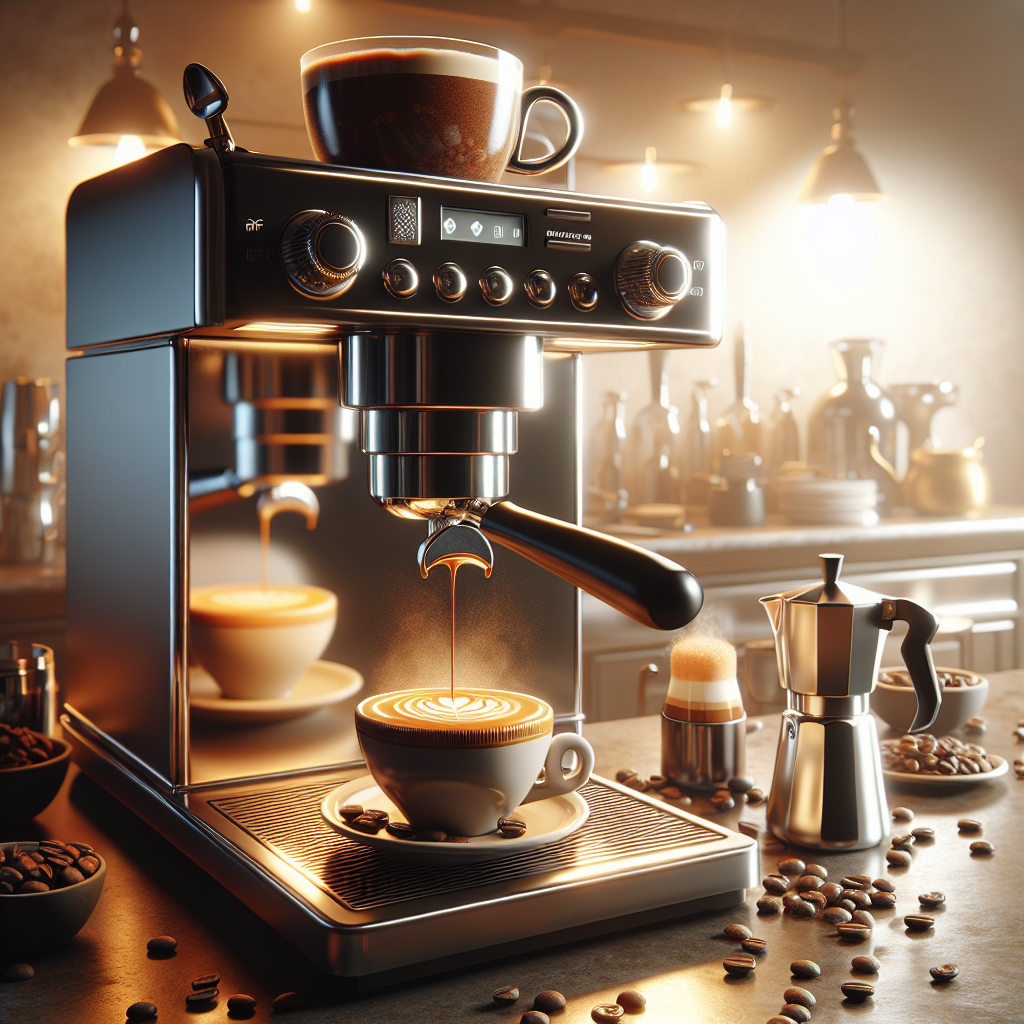“`html
Mastering the Art of Espresso: A Comprehensive Guide to Using Your Breville Coffee Machine Like a Pro
1. Selecting the Right Coffee Beans
Selecting the right coffee beans plays a crucial role in achieving optimal espresso flavor. Understanding factors such as coffee origin, roast type, and freshness ensures a high-quality brew every time.
Selection of Coffee Beans
| Aspect | Details | Pros | Cons |
|---|---|---|---|
| Origin | Where the beans are sourced. | Unique flavors and characteristics. | Availability may vary. |
| Roast Type | Light, medium, and dark roasts. | Variety of flavor profiles. | May not suit all preferences. |
| Freshness | Newly roasted vs. stale beans. | Better taste and aroma. | Requires storage considerations. |
| Single-Origin | Beans from one location. | Distinct tastes and qualities. | Limited availability. |
| Blends | Combination of different beans. | Balanced flavor profile. | May lack unique characteristics. |
| Type | Arabica vs. Robusta. | Arabica = smooth, sweet; Robusta = strong, bitter. | Some prefer one over the other. |
| Ethical Choices | Fair trade and organic. | Supports sustainable practices. | Possible higher cost. |
Understanding Bean Quality
The foundation of a great espresso lies in the quality of the beans. Beans should be freshly roasted and sourced from reputable suppliers. Look for beans specifically labeled for espresso to ensure they have the right characteristics for brewing rich, flavorful espresso shots.
Storage Tips
Proper storage of coffee beans is essential for maintaining their freshness. Store beans in an airtight container in a cool, dark place. Avoid keeping beans in the fridge or freezer as moisture can affect their quality.
Single-Origin vs. Blends
Single-origin beans come from a specific location and offer unique flavors reflective of their origin. Blends combine beans from various regions to create a balanced flavor profile. Choose based on your preference for distinct flavors or a more consistent taste.
Roasting Levels
Roasting levels greatly influence the flavor of espresso. Light roasts are more acidic and bright, medium roasts offer a balance of acidity and body, while dark roasts are robust and full-bodied. Taste different roast levels to find your ideal flavor.
## 2. Achieving the Perfect Grind
Grinding Consistency
The grind size is key to a successful espresso shot. Aim for a fine consistency that resembles table salt for the best extraction results when brewing espresso. Consistency in grind size ensures uniform extraction and enhances flavor.
Choosing a Burr Grinder
Invest in a burr grinder because it provides a more consistent grind compared to blade grinders. Burr grinders allow precise control over the grind size, which is crucial for producing high-quality espresso.
Adjusting Your Grinder
Dialing in the correct grind size can take a few attempts. Start with a medium-fine setting and adjust based on the taste and extraction time. Too fine a grind can result in a bitter shot, while too coarse can lead to under-extraction.
Impact of Grind Size on Extraction
The size of your grind directly affects the extraction process. Fine grinds offer more surface area for water to extract flavors, leading to a richer shot. Coarse grinds, on the other hand, result in faster water flow and weaker coffee.
Cleaning Your Grinder
Regularly clean your grinder to remove coffee buildup, ensuring consistent grind quality. Follow the manufacturer’s recommendations for disassembly and cleaning intervals.
## 3. Mastering Extraction Timing
Optimal Extraction Timing
Achieve a balanced espresso by aiming for a 1:2 coffee-to-espresso ratio, usually reached in 20-30 seconds. This timing allows for optimal flavor extraction without resulting in bitterness.
Manual Mode Benefits
Utilize the Breville’s manual mode to control extraction timing precisely. Manual control allows you to stop the flow of espresso at the ideal moment, ensuring consistent flavor profiles.
Avoid Pre-Timed Buttons
Pre-timed single or double shot buttons may not cater to the specific needs of every batch of coffee beans. Avoid using these and instead rely on manual adjustments for better precision.
Target Brew Time
Aim for a brewing time of 20-30 seconds. Monitor the flow of espresso; it should transition from dark and thick to a lighter, steady stream. Adjust your grind size and dose accordingly to hit this target.
Observation and Adjustments
Pay attention to visual cues and taste to make necessary adjustments. A well-extracted shot will have a rich, caramel-colored crema, while an under-extracted shot flows quickly and looks pale.
Impact of Coffee Dose
Varying the coffee amount can also affect extraction. More coffee equals more resistance to water, requiring adjustments in grind size and tamping pressure.
Consistency in Shots
Achieving uniform results requires practice. Keep your techniques consistent, and only change one variable at a time to accurately gauge its impact.
Refining Technique
Continuous experimentation and refinement are necessary to perfect your shots. Document your methods and outcomes to identify what works best for you.
## 4. Preparing Your Machine (SEO Keyword: How to Use Breville Coffee Machine)
Preheating the Machine
Allow your Breville coffee machine at least 20 minutes to preheat. This ensures that the internal components and the portafilter reach the optimal temperature for brewing.
Portafilter Preheating
Ensuring that the portafilter is warm helps in maintaining the correct extraction temperature. Run a blank shot (without coffee) through the portafilter if needed.
Proper Tamping Technique
Evenly distribute and tamp coffee grounds in the portafilter. A proper tamp ensures uniform extraction by providing consistent pressure, leading to a balanced shot.
Temperature Control
Water temperature should ideally be between 195°F and 205°F (90°C – 96°C). This range maximizes extraction without scalding the coffee.
Loading the Portafilter
Fill the portafilter with the ground coffee. Level the coffee bed before tamping down with consistent pressure. Ensure no coffee grounds are on the rim of the portafilter to prevent leaks.
Steam Wand Positioning
For milk-based drinks, position the tip of the steam wand just below the surface of the milk. This technique introduces air, creating microfoam ideal for lattes and cappuccinos.
Maintenance Routine
Regularly clean all parts of your machine, including the portafilter, group head, and steam wand. Maintaining cleanliness will improve the taste of your espresso and extend the machine’s lifespan.
Machine Calibration
Periodically calibrate your machine for optimal performance. Follow the manufacturer’s guidelines for specific calibration procedures.
## 5. Perfecting Milk Frothing and Texturing
Milk Frothing Technique
Place the steam wand tip just below the milk surface. Gradually introduce air by lowering the jug, then submerge the wand to create a whirlpool effect, achieving smooth microfoam.
Creating Microfoam
Microfoam is essential for lattes and cappuccinos. Achieve it by keeping the steam wand tip close to the milk surface, allowing small amounts of air to incorporate gradually.
Choosing Milk Types
Different milk types froth differently. Whole milk produces a creamier foam, while skim milk creates more foam but with larger bubbles. Explore various options based on your preference.
Steam Wand Cleaning
Always purge and clean the steam wand after each use to prevent milk residue buildup. This practice ensures better hygiene and performance.
Temperature Monitoring
Ideal milk frothing temperatures range between 140°F and 155°F. Use a thermometer to keep track, avoiding temperatures above 160°F to prevent scalding.
Pouring Techniques
Pour milk from a height to integrate it well with the espresso. For latte art, practice controlling the milk flow and pitcher’s tilt to create different patterns.
Troubleshooting Frothing Issues
Common issues like large bubbles or lack of foam can be resolved by adjusting the steam wand position and milk jug angle. Practice and observation are key.
Best Practices for Beginners
Start with smaller quantities of milk and gradually increase as you get comfortable. Watch tutorials and practice regularly to improve your milk frothing skills.
## 6. Maintaining and Cleaning Your Breville Coffee Machine (SEO Keyword: Breville Coffee Machine Tips)
Routine Cleaning Schedule
Establish a routine cleaning schedule to maintain your machine’s performance. Daily tasks include wiping down the steam wand and portafilter while deep cleaning should be done weekly.
Cleaning the Portafilter
After each use, remove coffee residue and oils from the portafilter. Use a soft brush or cloth to clean the basket and handle thoroughly.
Descaling the Machine
Descale your machine regularly to prevent mineral buildup. Follow the manufacturer’s instructions for descaling solutions and processes.
Steam Wand Maintenance
Consistently clean the steam wand to prevent milk residue buildup. After each use, purge the wand and wipe it down with a clean cloth.
Group Head Cleaning
Backflush the group head with a cleaning solution to remove coffee oils and buildup. Do this monthly or as recommended by the manufacturer.
Replacing Parts
Regularly inspect and replace parts as needed, such as gaskets, seals, and filters. Keeping spare parts on hand ensures uninterrupted performance.
Storage Tips
If not using your machine for an extended period, clean and store it in a cool, dry place. Protect it from dust and moisture to maintain its condition.
Troubleshooting Common Issues
Familiarize yourself with common issues such as inconsistent shot quality or steam wand blockages. Refer to the user manual for troubleshooting steps or contact customer support for assistance.
—
Explore detailed coffee machine guides and tips here.
Ready to refine your espresso-making skills? Start experimenting with different techniques and beans, and don’t forget to check out our other coffee drink guides and blog posts for more inspiration and tips. Happy brewing!
“`
Shop at Breville now!
https://breville.oie8.net/oqDqrE
Shop Breville Coffee Machine at Amazon now!
Click here





